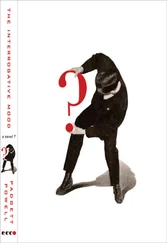The diner was open but not serving food, and the drive-in let you park and put a speaker in your car but showed no movie. You passed your unused napkin back to the waitress with a very small tip, and you put the silent speaker back on its post and drove away. The world was getting easier, in its way, as it got harder to figure. People were confused somewhat, but they were losing weight and were not subject to sex and violence from Hollywood. Children were not acting confused at all, but — here was a thing to ponder — they had never been overweight, and they had never objected to sex and violence in their entertainment. Things, people felt, would make sense if they could just think them through. “Sit and contemplate your navel,” the comic farmer liked to put it. “Sit and contemplate your navel.”
They sat and contemplated the government-suppressed price of wheat, which was at least a dollar per bushel lower than what it cost to produce a bushel of wheat; and contemplated not producing wheat as a protest; and contemplated why on earth they actually continued to produce wheat, losing, as they were, at least a dollar per bushel; and contemplated, finally, precisely how they were able still to produce wheat if they had in fact lost at least a dollar per bushel on the last hundred million or so bushels. It was this — still producing wheat — that made contemplation of the navel a somehow more reasonable and easy thing to consider. But contemplating the navel was something no one really knew anything about, and moreover, they suspected that that contemplation required a specific if not downright exotic place, and all of their place was plain.
“That goldarn government of ours,” the farmer prone to comedy announced one morning to the other farmers not eating at the diner, “is wigged out.” Strangely coordinated, the farmers all together gently passed their clean napkins and their dimes to the waitress and wordlessly eased out of the diner. The comic farmer sat there, surprised at his foolishness in testing the expression so … so blithely a second time. He noticed that all the departing farmers wore the same co-op hat — color and apparent age of the caps looked identical. It was as if new hats had been handed out at an assembly that he had missed. This was impossible. There were no assemblies, certainly no hat-handing-out assemblies, and he would not have missed it if there had been such an assembly, or any kind of assembly at all. He thought immediately of alien movies: Had all his peers been possessed by …? Or were they normal, and his old-hattedness an index that he had somehow gotten out of step? They had had a co-op party, say a wheat tour, had handed out a hundred brand-new mesh caps, and he had been somewhere else, watching TV for new material or contemplating his navel without knowing it. Kansas was becoming a strange and dangerous terrain.
He sat in the diner alone with fifty clean napkins and fifty shiny dimes.
I FELL OFF THE lightning rod.
I entered the sweepstakes.
I lost control.
I became beautiful.
I charmed a queen.
I defied gravity.
I moved mountains.
I bowled.
I wept, mourned, moped, and sped about town in a convertible, progressively irascing the gendarme until I was charged with exhibitionist speed.
I billed my ex-wife for lost consortium.
I filled a prophylactic with water until it was the size of the bathtub.
I let a trapped bird out of the house. Wren, I think.
I felt ill.
I felt better.
I say.
I’m alive to everything, consequently alert to nothing.
Bully, my mother would say.
I wish I dressed in light white linens through which my pink skin could be seen by the natives.
The county constabulary has a gym, and all constables weigh 300 to 400 pounds each.
I wish I were a redheaded Fort Worth millionaire ten times. I’d have a good truck, jewelry, ironed jeans, neat house, docile wife, decent daughters, bushy eyebrows, pithy maxims, damn nigh aphorisms now, and very little trouble except possibly nagging prostate. And good boots. Preferably Luccheses, settle for Sanders.
The main thing is: Don’t take any shit.
That’s the main thing.
The unmain thing is: You are not going to figure anything out except how to get other people to take shit, so forget about everything except not taking any yourself.
When your hair turns white, unless you are under forty, a senator, or in the movies, better punt.
If wooden rowboats would only make a comeback …
Girl Scout cookies, Girl Scout cookies, Girl Scout cookies.
If a boy is afraid of the dark and wets the bed, try hard, very hard, not to comment in any language.
He will grow to put you softly in your grave.
YOU CAN’T RAMBLE AROUND the woods in your truck going to fish camps without drinking. You’ll meet up with an appointed manager of a landing that has one or two boats go out a day, or a week, and he’ll sit you down in a chair on the lawn and sit beside you and slap his knee and finally offer you a beer and you will have to take it or you won’t should have sat down in the first place with such a man in such a position in the fading, old world.
After about thirty minutes, a codger like this in such a position — you all sitting there reading the hydrilla-warning sign which, as much as anything else, is why he’s likely to make about only $30 from launch fees the entire month, reading that sign for thirty minutes — he might slap his knee again and say, “Boy, I could use some sex.”
“Me too,” you say, before you think very much, but you are in it now. Brace yourself a bit, maybe try to get another beer quick, but don’t run, because a man in his position is generally highly politic.
“Do you want me to suck your dick?” he says, not reading the hydrilla sign now but looking you dead in the eye like the world’s greatest salesman or priest or politician or doctor giving you the straight poop.
“Oh, naw. Thanks, but no. Thanks,” you say, and read the hydrilla sign carefully.
“No shame to it, bud,” he may say. “Nothing in the world I like better.”
Basically you are looking at a grisly, lumpy man who might have changed people’s oil for a living, unless he somehow got this job, which is watching the place for a rich person somewhere and taking the $1.00 from every party what runs his boat up or down the busted-up concrete slab that nobody with a heavy boat better go too far down or he’ll never get out.
“Naw.” You say this again and give him one of the earnest level-eyes and he’ll get your meaning and his hopes will ebb out and you’ll both be back to sign reading and stretching around in the lawn chairs and maybe you’ll be ready a little earlier than you might have otherwise to get back in your truck and ramble into the woods and drink your own beer and ramble.
It might be a good thing to stop somewhere particularly scenic — maybe some young longleaf pines in clear air taking a little breeze in their rich brilliant silky sappy needles — and announce, “Perversion is pandemic.” That may be a most pleasant thing to stop your rambling in the woods drinking and do.
ON A LOW-COUNTRY PLANTATION, where I am invited but do not belong, there is a group of young women dressed up and going to a ball, or cotillion — if that is the word, and I doubt that it is — or even wedding, at another plantation, as happens here: you frequently go to one party in order to prepare for another party. They are in white finery that looks to me bridal but probably is just formal. One of the women is striking. She is rather small, compact, tanned, her hair back tight — she looks like an accomplished horsewoman in an evening gown; a bit out of her water but not unhappy about it. She and the other women are heading out, somewhat cattle-like, stragglers and strays but in the main accomplishing the harried exodus. I catch her eye. There is no time or place for introductions. I go up and suddenly take her by both hands firmly: “I’m quite unlikely ever to see you again.”
Читать дальше












